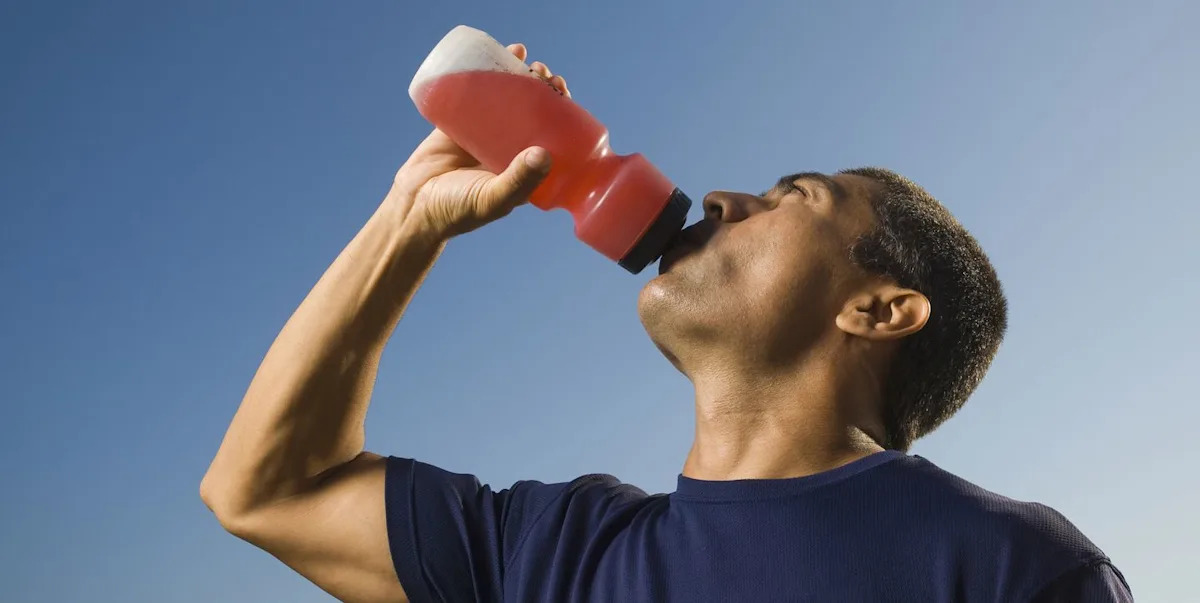For many, an electrolyte drink has become a daily staple. On social media, fitness influencers constantly post about their favourite brands and flavours, and it’s starting to feel like electrolytes are a health need rather than a want.
However, NHS Doctor and marathon runner Dr Miranda Layton – also known as Dr Mimi Runs – has warned her followers about the potential risks of drinking too many electrolytes.
In a recent Instagram Reel, Dr Mimi, who regularly posts sports science content, warned:
‘Here is what the fitness industry doesn’t want you to know: You might be drinking too many electrolytes. Most electrolyte drinks are high in sodium, which is just salt – the same stuff we put on our food. Most people already get enough salt in their diet without factoring in all the salty electrolyte drinks. We know that too much salt in the blood over time can raise your blood pressure, but in the short term, overconsumption of electrolytes can cause dangerous changes to your heart rhythm – especially if you’re not actually dehydrated.’
When should you drink electrolytes?
That isn’t to say all electrolytes are unnecessary. When you’re exercising – often for long periods – your body’s fluid balance can be affected, which can, in turn, affect your performance. ‘Electrolytes are charged minerals like sodium, potassium, and magnesium that help your body absorb fluids, contract muscles, transmit nerve signals, and regulate pH. They’re vital – but they’re also easy to lose,’ says Sanjeev Pathak, a longevity expert and host of the Let’s Grow Young podcast.
‘While a balanced diet, lightly salted meals, and drinking to thirst work for many, certain situations demand more intentional hydration,’ explains Pathak. He says to consider an electrolyte drink – ideally in powder form without gelling agents or fillers – when:
-
Exercising in the heat: ‘You can lose up to seven grams of sodium per day through sweat. Rehydrate with salty water to thirst to prevent dehydration and exercise-associated hyponatremia (low blood sodium).’
-
Cold or high-altitude training: ‘Both can disrupt your thirst response, meaning you may under-drink without realising it. Proactive fluid intake becomes critical.’
-
Low-carb or keto dieting: ‘Low insulin levels on these diets trigger sodium loss through urination. Combine this with naturally low-sodium whole foods, and you’re at risk for sodium deficiency. Translation: low carbers need more salt.’
Indeed, in a 2015 study investigating the effectiveness of salt supplementation during a half-ironman triathlon, researchers found that athletes who supplemented with salt, plus other electrolytes and a sports drink, before and during the race improved their race times by 8% on average. The researchers also found that the salt supplementation helped stimulate thirst, meaning the athletes drank more, which improved their hydration.
There’s also evidence to suggest that electrolyte supplementation can support exercise recovery. A recent study published in the Journal of Sports Science and Physical Education investigated the impact of different pre-exercise hydration strategies for HIT (high-intensity training), including water, electrolyte solutions and carbohydrate-electrolyte sports drinks. The randomised control trial of 60 athletes (30 men and 30 women, aged 18-35) found that those who consumed carbohydrate-electrolyte sports drinks demonstrated significantly better performance and recovery outcomes compared to those who consumed water or electrolyte solutions alone.
When shouldn’t you drink electrolytes?
However, as with most aspects of nutrition, when it comes to electrolytes, balance is key. ‘Excess can be just as harmful as deficiency,’ says Pathak. ‘Overdoing it can lead to arrhythmias, nerve dysfunction, and organ damage. Balance is key. I recommend only supplementing with electrolytes when your body’s losing more than food can replace.’
The dangers of electrolyte overload
Pathak highlights that common electrolyte overloads can include:
-
Sodium (hypernatremia): Thirst, confusion, seizures.
-
Potassium (hyperkalemia): Irregular heartbeat, weakness, risk of cardiac arrest.
-
Calcium (hypercalcemia): Fatigue, kidney stones, confusion.
-
Magnesium (hypermagnesemia): Nausea, low blood pressure, breathing issues.
-
Chloride (hyperchloremia): Weakness, high blood pressure.
Explaining the shorter-term risks of excessive electrolyte consumption, NHS GP Dr Ravina Bhanot says: ‘High sodium can cause bloating, increase thirst and drive up your blood pressure and put pressure on your heart, which is not good for your heart health – and some high electrolyte drinks can cause stomach upset and irritate the gut lining, which can affect your bowel habit.’ Too much magnesium in drinks can also cause diarrhoea, she adds.
In terms of longer-term risks, Bhanot says: ‘An imbalance of electrolytes in the body, like high sodium or high potassium, can be very dangerous and lead to heart arrhythmias, palpitations, and affect the nervous system.’ She adds that you can risk acute kidney injury if consuming high potassium or high sodium, and that increased blood pressure can, in turn, increase your risk of heart disease.
If you sweat more, do you need more electrolytes?
While you might require more electrolytes if you sweat more, Bhanot says other things also come into play. It will depend on how hot it is and the humidity levels – and the duration and intensity of the exercise you’re doing. For instance, you’re probably going to want to take electrolytes during any longer marathon training runs you’ve got planned in the coming months.
Generally, experts – including Dr Mimi – advise electrolyte drinks in certain contexts and conditions. As she summarised in her Instagram post: ‘Unless you’re really exercising for more than 75 minutes, exercising in heat or altitude, you probably don’t need the extra salt from the electrolytes.’
You Might Also Like
